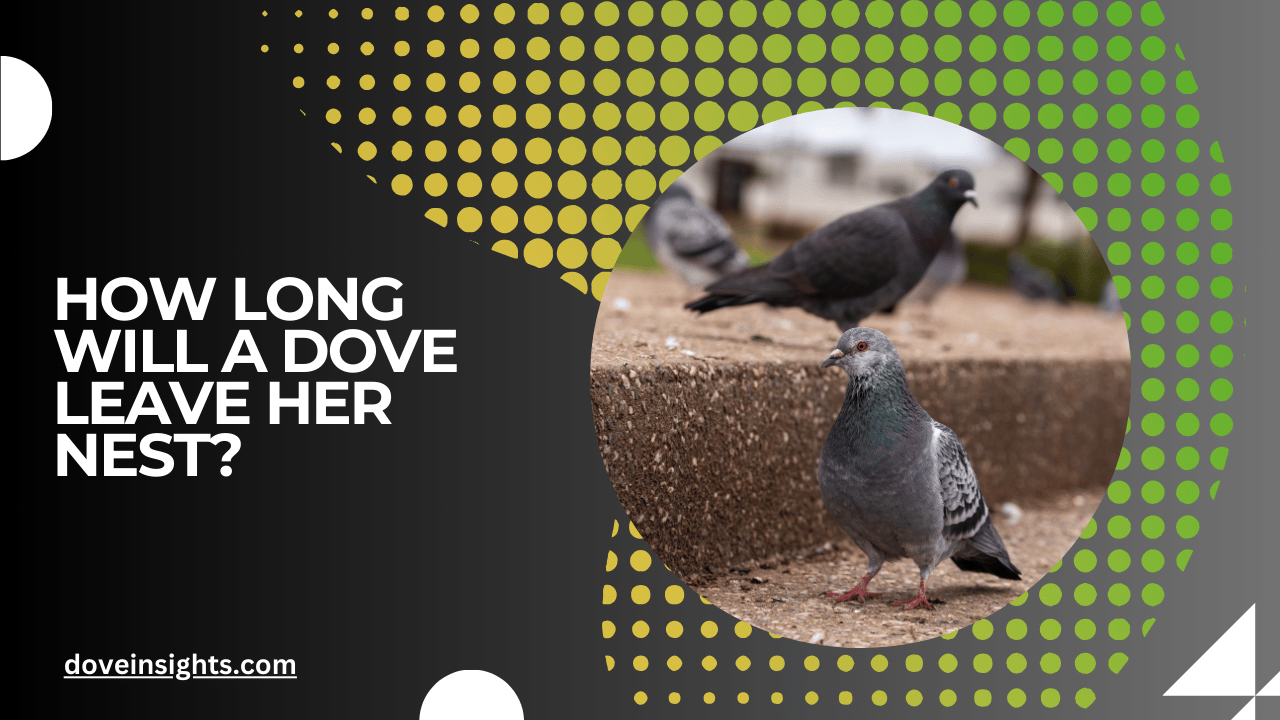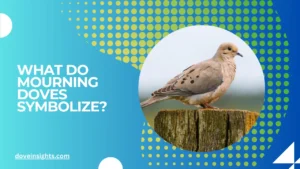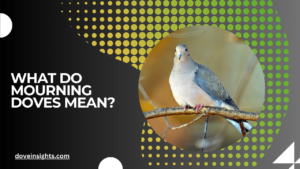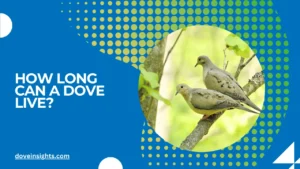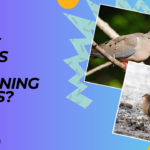Doves, with their graceful flight and soft coos, are symbols of peace and serenity.
However, behind their gentle exterior lies a remarkable dedication to their offspring. One of the most intriguing aspects of dove behavior is their nesting habits, particularly how long a mother dove will leave her nest.
This question might seem simple at first, but the answer involves a deep understanding of dove parenting, incubation, and protection.
A mother dove’s decision to leave her nest is far from arbitrary. It’s influenced by factors like food availability, nestling development, and the ever-present threat of predators.
These mating rituals and protective behaviors are vital for the survival of the young, and understanding them can give us a deeper appreciation of these delicate creatures. In this article, we’ll explore the different aspects of dove nesting, how long a dove typically stays off her nest, and why she behaves in certain ways during this critical period.
Whether you’re a birdwatcher, a curious nature enthusiast, or simply someone who loves doves, learning about how long a dove will leave her nest can give you fascinating insights into the world of these captivating birds.
So, let’s dive deeper into the nesting behaviors of doves and discover the reasons behind their unique parenting style.
Contents
- 1 Dove Nesting Behavior – A Brief Overview
- 2 The Incubation Period and Dove Nesting Duties
- 3 Factors That Influence How Long a Dove Leaves Her Nest
- 4 Dove Parental Roles – Shared Responsibilities
- 5 How Long Will a Dove Leave Her Nest After the Eggs Hatch?
- 6 Conclusion:
- 7 FAQ’s
- 7.0.1 How long do female doves leave their nests during incubation?
- 7.0.2 What factors influence how long a mother dove leaves her nest?
- 7.0.3 Do male doves play a role in incubation?
- 7.0.4 How often does a dove leave her nest after the eggs hatch?
- 7.0.5 How long do dove chicks stay in the nest?
- 7.0.6 Can doves leave their nests unattended?
Dove Nesting Behavior – A Brief Overview
Doves are monogamous birds that form strong pair bonds, often staying with the same mate for life. The nesting behavior of doves is a carefully orchestrated process that involves courtship, building the nest, egg-laying, and the subsequent care of the young.
Unlike many bird species, doves have relatively simple nests made of twigs, grasses, and leaves, typically built in the branches of trees or shrubs. However, the real question arises during the incubation and early stages of parenting—how long does a dove leave her nest, and why?
When a female dove lays her eggs, the male typically takes on the responsibility of guarding the nest, while the female incubates the eggs. However, both parents share the duty of feeding and protecting their chicks once they hatch.
During the incubation period, the female will usually stay on the nest for long stretches of time but may occasionally leave briefly to feed or to take a break.
The key factors influencing how long a mother dove will leave her nest are food availability, the stage of egg incubation, and the age of the chicks. Let’s take a closer look at these factors in the following sections.
The Incubation Period and Dove Nesting Duties
The incubation period of doves typically lasts between 12 to 14 days. During this period, the female dove plays the most critical role in keeping the eggs warm. She will often sit on the eggs, ensuring they stay at a consistent temperature.
However, like most birds, she cannot stay on the nest indefinitely.
The mother dove will leave the nest for short periods to search for food—mostly seeds and grains. These quick departures are essential to keep her strength up and ensure she can continue incubating the eggs effectively.
The father dove, during these brief absences, will often take over the guarding and protection duties, ensuring the nest remains safe from predators and other threats.
While the mother’s absences are typically brief, they can vary depending on environmental factors such as food availability and weather conditions. In extreme weather conditions, doves may spend more time away from the nest in order to find adequate food.
However, even when leaving briefly, the female dove remains highly protective of her nest, returning as soon as possible to keep the eggs warm.
Factors That Influence How Long a Dove Leaves Her Nest
Several factors influence how long a female dove will leave her nest, and understanding these can help explain the birds’ behavior during the incubation period.
- Food Availability: Doves need to find adequate food to sustain themselves, especially the female dove, who requires energy for both egg incubation and foraging. If food is scarce, she may leave the nest more frequently or for longer periods. The male, however, will still be on the lookout for predators and other dangers.
- Predator Threats: One of the main reasons a mother dove will leave her nest is to avoid predators. If the nest is under threat, the mother might leave quickly to find a safer place for a while. Conversely, if the nest is secure, she may remain longer.
- Weather Conditions: In some cases, harsh weather conditions can force the mother dove to leave the nest in search of shelter or a more suitable environment to continue foraging for food. If conditions are unfavorable for extended periods, the dove may leave more frequently or for longer durations.
- Nesting Site: The location of the nest plays an essential role. If the nest is in a particularly safe or hidden location, the female may leave her eggs for longer periods, knowing that her absence poses less risk of predation. However, if the nest is in a more exposed area, she may only leave the eggs for short bursts to reduce the risk.
In dove species, parenting is a shared responsibility between both parents. While the female is primarily responsible for incubating the eggs, the male plays an important role in protecting the nest and feeding the female dove during her time off the nest.
Once the eggs hatch, the parents work together to feed their chicks with crop milk, a nutritious secretion produced by both the male and female doves.
During the early stages of chick development, the female dove will leave the nest even less often, but it is the male dove who typically takes over the guarding duties, keeping predators at bay while the female goes out to forage for food.
In the case of nestling care, the male dove plays an equally important role, ensuring the chicks remain safe from external threats while the female dove feeds and maintains their energy levels.
The equal division of responsibilities between the male and female doves is one reason their nesting success rate is relatively high compared to other bird species.
How Long Will a Dove Leave Her Nest After the Eggs Hatch?
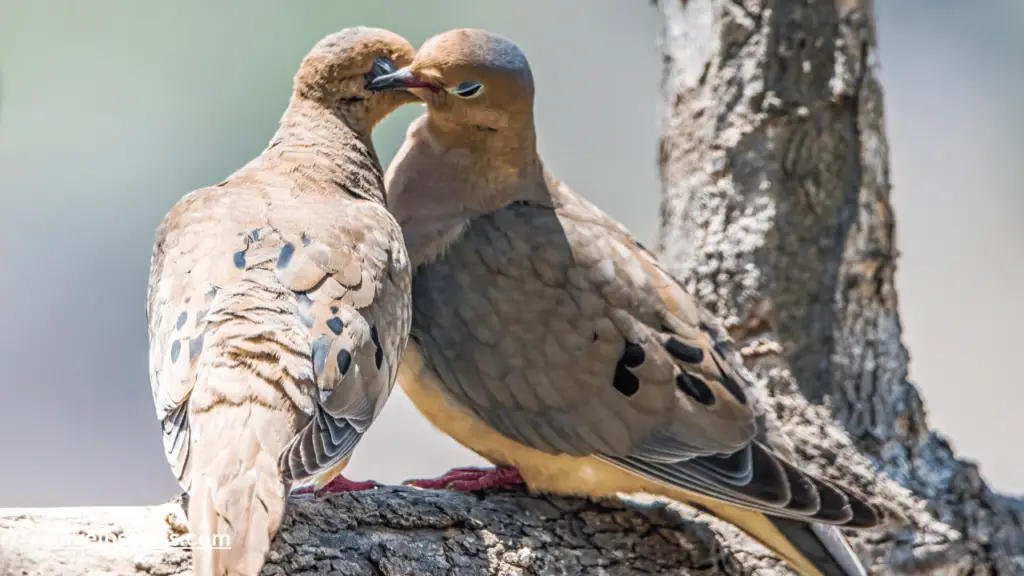
After the eggs hatch and the chicks are born, the dove mother’s role evolves. At this stage, both parents share the task of feeding the chicks, with both the male and female doves producing crop milk.
Unlike the incubation period, where the female dove is required to stay on the nest for long periods, after the chicks hatch, the mother may leave the nest for longer stretches to forage and replenish her strength.
The chicks will remain in the nest for approximately 10-15 days, during which time they will be fed and protected by both parents.
However, as the chicks begin to grow and develop, they will spend more time outside of the nest, and the mother may leave for increasingly longer periods, sometimes even several hours at a time.
By this point, the chicks are much more independent, and the female dove’s need to stay on the nest diminishes. As the chicks near fledging age, the parents will encourage them to leave the nest entirely, marking the end of the nesting cycle.
Conclusion:
The question of how long a dove will leave her nest is more complex than it seems. A mother dove’s decision to leave her nest is influenced by a delicate balance of factors, including food availability, predator threats, weather conditions, and the needs of her growing chicks.
Understanding these behaviors not only highlights the adaptability of these birds but also offers us a glimpse into the intricate world of bird parenting.
As we’ve explored, the mother dove will leave her nest for short periods during the incubation phase to find food and avoid danger.
After the chicks hatch, both parents share the responsibility of caring for their offspring. The nurturing behavior of doves is a reminder of the complexities of animal parenting and the care that goes into ensuring the survival of the next generation.
Whether you are a passionate bird lover, a conservationist, or simply someone interested in dove behavior, knowing how long a dove will leave her nest gives us a greater understanding of their needs and the challenges they face.
By respecting their space and protecting their natural habitats, we can help ensure the continued success of these beautiful birds for generations to come.
FAQ’s
How long do female doves leave their nests during incubation?
Female doves typically leave their nests for brief periods of 15 minutes to an hour to forage for food.
What factors influence how long a mother dove leaves her nest?
Food availability, predator threats, weather conditions, and the location of the nest all influence how long a dove will leave her nest.
Do male doves play a role in incubation?
Yes, male doves assist by guarding the nest and ensuring its safety while the female dove incubates the eggs.
How often does a dove leave her nest after the eggs hatch?
After hatching, both parents share the responsibility of feeding the chicks, and the female dove leaves the nest for longer periods as the chicks grow stronger.
How long do dove chicks stay in the nest?
Dove chicks stay in the nest for 10-15 days before they begin to fledge and leave the nest.
Can doves leave their nests unattended?
Doves may leave their nests briefly but are generally careful to ensure the safety of their eggs or chicks.

